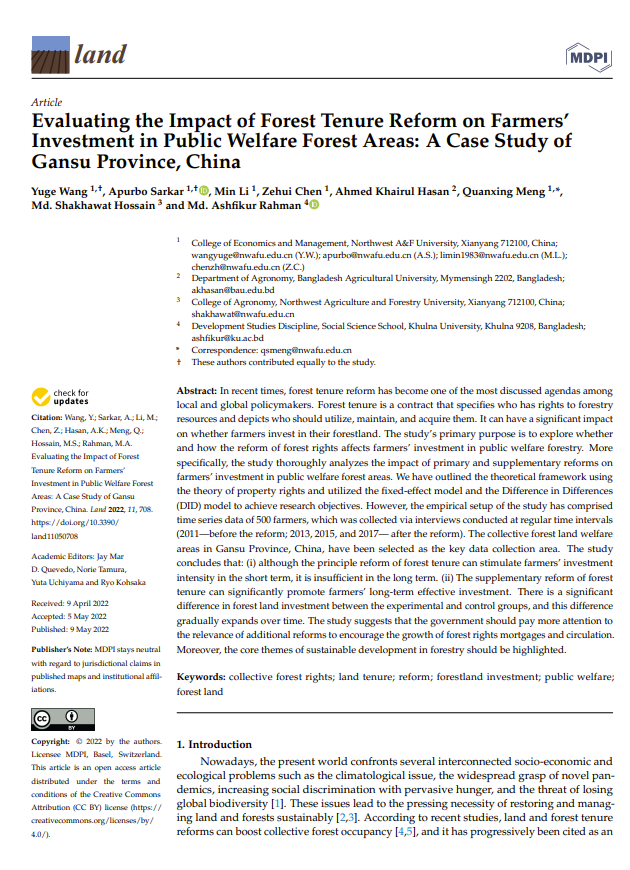Location
MDPI AG, a publisher of open-access scientific journals, was spun off from the Molecular Diversity Preservation International organization. It was formally registered by Shu-Kun Lin and Dietrich Rordorf in May 2010 in Basel, Switzerland, and maintains editorial offices in China, Spain and Serbia. MDPI relies primarily on article processing charges to cover the costs of editorial quality control and production of articles. Over 280 universities and institutes have joined the MDPI Institutional Open Access Program; authors from these organizations pay reduced article processing charges. MDPI is a member of the Committee on Publication Ethics, the International Association of Scientific, Technical, and Medical Publishers, and the Open Access Scholarly Publishers Association (OASPA).
Members:
Resources
Displaying 396 - 400 of 1524Evaluating the Impact of Forest Tenure Reform on Farmers’ Investment in Public Welfare Forest Areas: A Case Study of Gansu Province, China
In recent times, forest tenure reform has become one of the most discussed agendas among local and global policymakers. Forest tenure is a contract that specifies who has rights to forestry resources and depicts who should utilize, maintain, and acquire them. It can have a significant impact on whether farmers invest in their forestland. The study’s primary purpose is to explore whether and how the reform of forest rights affects farmers’ investment in public welfare forestry.
Impact of Insecure Land Tenure on Sustainable Agricultural Development: A Case Study of Agricultural Lands in the Republic of Benin, West Africa
This study assesses the impact of insecure land tenure on sustainable agricultural development in Africa to demonstrate how the economic profitability of agriculture strongly depends on land tenure security. The Republic of Benin is used as the case study following the country’s recent enactment of land law 2013-01 that focuses on reorganizing the land sector, which has suffered from inappropriate management since the colonial era.
Exploring the Influence of Land Titling on Farmland Transfer-Out Based on Land Parcel Data
Existing literature about the impact of farmland titling on farmland transfer takes no account of farmland plot characteristics, which makes them unable to effectively identify the causal relationship between farmland titling and farmland transfer. After the theoretical analysis, based on land plot level micro-survey data, we adopt the instrumental variable (IV) and conditional mixed process (CMP) methods to ease the endogeneity problem in the model and conduct a quantitative analysis.
Anthropogenic Land Use Change and Adoption of Climate Smart Agriculture in Sub-Saharan Africa
Compelling evidence in Sub-Saharan Africa (SSA) shows that Climate-Smart Agriculture (CSA) has a positive impact on agricultural productivity. However, the uptake of CSA remains low, which is related to anthropogenic, or human-related, decisions about CSA and agricultural land use. This paper assesses households’ decisions to allocate agricultural land to CSA technologies across space and over time. We use the state-contingent theory, mixed methods, and mixed data sources. While agricultural land is increasing, forest land is decreasing across countries in SSA.
‘Generation Rent’ in a Super Homeownership Environment: The Case of Budapest, Hungary
The paper examines the applicability of the concept of ‘generation rent’ in the ‘super-homeownership’ housing regime and better-off focused welfare regime of Hungary. Available official statistical and survey data show the increase in private rentals among young households, and the appearance of private rental housing as a potential longer-term solution in the attitudes of young people towards housing. In the Hungarian context, the strong role of intergenerational transfers in access to home ownership and public housing policies contribute to the development of a ‘generation rent’.






